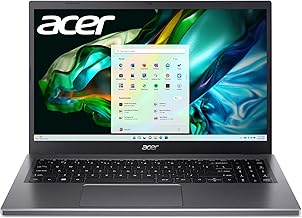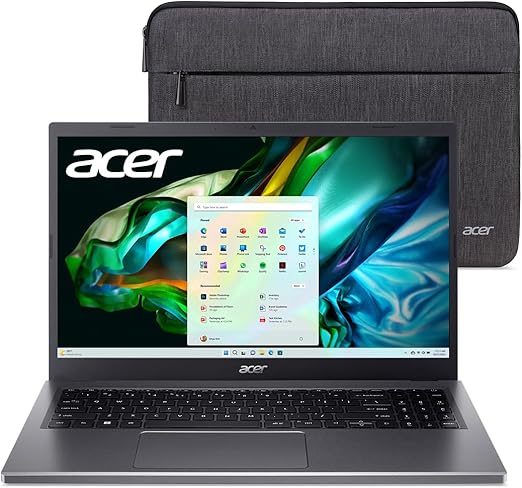
Check this out on Amazon
Introduction
When it comes to selecting a laptop, understanding the differences between various types is essential. One common question that arises is, “What is the difference between a business laptop and a personal laptop?” This distinction is important because the right laptop can significantly impact productivity, user experience, and overall satisfaction.
Business laptops are designed with professional use in mind, often featuring enhanced durability, security, and performance capabilities. On the other hand, personal laptops cater to casual users, focusing on entertainment, versatility, and aesthetic appeal.
In this post, we’ll explore these differences in detail, helping you make an informed decision based on your specific needs and preferences. Whether you’re a business professional on the go or a casual user seeking a reliable device, understanding these distinctions will guide you toward the best choice.
Understanding Business Laptops

Business laptops are specifically designed to meet the needs of professionals and organizations. They prioritize performance, reliability, and security, making them suitable for a wide range of work-related tasks.
Definition and Purpose: Business laptops are built to support demanding applications, multitasking, and extended use. They often come equipped with features that enhance productivity, such as high-performance processors, ample RAM, and long battery life. Their primary purpose is to facilitate work, whether in the office, at home, or on the go.
Typical Users and Use Cases: These laptops are ideal for business professionals, corporate teams, and remote workers. They are commonly used for tasks like data analysis, software development, video conferencing, and document management. The target users include executives, IT professionals, and anyone who requires a reliable machine for intensive workloads.
Key Features:
- Durability: Business laptops are often constructed with sturdy materials to withstand the rigors of travel and daily use. Many models also undergo military-grade testing for resilience.
- Security: Enhanced security features, such as fingerprint scanners, TPM chips, and encryption capabilities, help protect sensitive data from unauthorized access.
- Support and Warranty: Business laptops usually come with better customer support options and longer warranty periods, ensuring that professionals can quickly resolve issues without significant downtime.
In summary, business laptops are tailored for professional use, offering the performance, durability, and security features needed to support various work environments. Understanding these characteristics is essential when considering what is the difference between a business laptop and a personal laptop.
Understanding Personal Laptops

Personal laptops are designed primarily for everyday users who need a versatile and accessible device for various tasks. Unlike business laptops, which focus on performance and security, personal laptops prioritize ease of use, entertainment, and aesthetic appeal.
Definition and Purpose: Personal laptops are versatile devices that cater to a wide range of activities, including browsing the internet, streaming videos, gaming, and casual productivity tasks. Their main purpose is to provide an enjoyable computing experience for everyday users, whether at home or on the go.
Typical Users and Use Cases: The target audience for personal laptops includes students, families, and casual users who require a device for light computing tasks. These users often engage in activities like social media, online shopping, content consumption, and word processing.
Key Features:
- Variety of Designs: Personal laptops come in a multitude of styles, colors, and sizes, allowing users to choose a device that fits their personal taste and lifestyle.
- Affordability: Many personal laptops are available at a range of price points, making them accessible for budget-conscious consumers.
- Casual Performance: While they can handle everyday tasks, personal laptops may not have the high-end specifications found in business laptops. They typically feature standard processors, moderate RAM, and integrated graphics suitable for light gaming and multimedia.
In summary, personal laptops are built for casual use, offering flexibility, affordability, and a wide array of design options. Understanding these characteristics is crucial when exploring what is the difference between a business laptop and a personal laptop.
Key Differences Between Business Laptops and Personal Laptops
Understanding what is the difference between a business laptop and a personal laptop is essential for making an informed choice. Here are the key distinctions across various categories:
Design and Build Quality
Business laptops are often constructed with more durable materials, such as aluminum or magnesium alloy, which provide enhanced resistance to wear and tear. They are designed to withstand frequent travel and heavy usage. In contrast, personal laptops may prioritize aesthetics and come in a variety of colors and designs, but they often use lighter materials that may not be as durable.
Performance and Specifications
Business laptops typically feature higher-performance components, including powerful processors, more RAM, and larger storage options. This enables them to handle multitasking and demanding applications seamlessly. Personal laptops, while capable of everyday tasks, usually come with standard specifications that are suitable for web browsing, streaming, and light productivity.
Security Features
Security is a critical focus for business laptops, which often include advanced features such as biometric authentication, encryption software, and Trusted Platform Module (TPM) chips. These tools help protect sensitive business data. Personal laptops, on the other hand, usually have basic security features that may not meet the rigorous demands of professional environments.
Software and Usability
Business laptops often come pre-installed with productivity software and applications designed for business use, such as Microsoft Office and collaboration tools. They also tend to offer better compatibility with corporate networks. Personal laptops focus more on entertainment and casual use, with software options tailored for gaming, media consumption, and social media.
Support and Warranty
Business laptops generally offer superior customer support and longer warranty periods, ensuring that professionals can resolve issues quickly and minimize downtime. Personal laptops may come with standard support options that are less comprehensive, which can be a consideration for users who want reliable service.
Connectivity and Ports
Business laptops are equipped with a wider array of ports, including multiple USB ports, HDMI, and Ethernet connections, facilitating connections to various peripherals. Personal laptops may prioritize wireless connectivity but could lack some of the diverse port options found in business models.
Battery Life and Power Management
Business laptops often feature longer battery life, allowing users to work for extended periods without needing to recharge. They also include power-saving features designed to optimize performance during intensive tasks. Personal laptops, while they can be efficient, may not always prioritize battery longevity to the same extent.
In summary, the differences between business laptops and personal laptops are significant and cater to distinct user needs. Understanding these key differences helps clarify what is the difference between a business laptop and a personal laptop, ensuring you choose the right device for your requirements.
When to Choose a Business Laptop

Deciding when to choose a business laptop depends on your specific needs and work environment. Here are some key scenarios where a business laptop is the ideal choice:
1. Professional Use
If you regularly engage in tasks that require high performance, such as data analysis, graphic design, or software development, a business laptop is essential. These laptops are equipped with powerful processors and ample RAM, enabling you to handle demanding applications efficiently.
2. Frequent Travel
For professionals who travel often for work, business laptops offer durability and portability. Their robust build quality can withstand the rigors of travel, and their lightweight design makes them easy to carry. A long battery life ensures you can work during flights or long meetings without needing to recharge.
3. Need for Enhanced Security
If your work involves handling sensitive data or confidential information, a business laptop is the right choice. These devices come with advanced security features, such as biometric authentication and encryption tools, providing the protection necessary to keep your data safe from unauthorized access.
4. Collaboration and Connectivity
In environments where collaboration is key, business laptops often provide superior connectivity options. They typically feature multiple ports for connecting to various peripherals and support for business-oriented software that facilitates teamwork and communication.
5. Dependable Support and Warranty
If you rely heavily on your laptop for work, having dependable customer support and a strong warranty is crucial. Business laptops usually offer extended warranties and responsive customer service, ensuring that any issues can be resolved quickly to minimize downtime.
6. Long-Term Investment
When considering a laptop for long-term use in a professional setting, investing in a business laptop can be more cost-effective. Their durability and performance often lead to a longer lifespan compared to personal laptops, making them a wise choice for organizations and professionals.
In summary, if your work demands high performance, security, and reliability, it’s clear when to choose a business laptop. Understanding these scenarios will help you answer the question, what is the difference between a business laptop and a personal laptop, and guide you toward making the best choice for your needs.
When to Choose a Personal Laptop

Choosing when to select a personal laptop largely depends on your lifestyle, usage patterns, and specific needs. Here are some key scenarios in which a personal laptop is the ideal option:
1. Casual Use
If you primarily use your laptop for casual activities such as browsing the internet, streaming videos, or using social media, a personal laptop is a suitable choice. These laptops are designed for everyday tasks and provide sufficient performance for non-intensive applications.
2. Budget Considerations
For individuals or families on a budget, personal laptops often come at more affordable price points. They offer a range of options that balance cost and performance, making them accessible for users who don’t need high-end specifications.
3. Portability and Style
If you value portability and design, personal laptops typically offer a variety of styles, colors, and sizes. Whether you prefer a sleek ultrabook or a vibrant, colorful model, you’ll find options that fit your personal taste and lifestyle. These laptops are generally lightweight, making them easy to carry around.
4. Flexibility in Usage
Personal laptops are versatile devices that cater to various use cases beyond work, such as light gaming, content creation, and educational purposes. If your computing needs are diverse and not heavily focused on professional tasks, a personal laptop provides the flexibility you need.
5. Entertainment and Multimedia
If your primary interest lies in entertainment, such as watching movies, playing casual games, or listening to music, a personal laptop is a great fit. Many personal models include features tailored for media consumption, like high-quality displays and enhanced audio systems.
6. Less Intensive Software Requirements
If you primarily use basic software applications, like word processors or web browsers, a personal laptop will meet your needs without the expense of higher-end hardware. These laptops are well-suited for tasks that don’t demand significant computing power.
In summary, a personal laptop is the right choice when your needs revolve around casual use, budget constraints, and flexibility. Understanding when to choose a personal laptop helps clarify what is the difference between a business laptop and a personal laptop, ensuring you select the device that best aligns with your lifestyle and requirements.
Conclusion
In conclusion, understanding what is the difference between a business laptop and a personal laptop is essential for making the right choice based on your needs. Business laptops are designed for professionals who require high performance, security, and durability, making them ideal for demanding work environments. They excel in areas such as advanced security features, customer support, and robust performance capabilities.
On the other hand, personal laptops cater to casual users who prioritize versatility, affordability, and style. They are perfect for everyday tasks like browsing, streaming, and light productivity, offering a wide range of design options to suit individual tastes.
By evaluating your specific requirements, such as the nature of your work, your budget, and how you plan to use the device, you can determine which type of laptop is best for you. Whether you lean towards a business laptop for professional use or a personal laptop for casual activities, knowing the key differences will guide you in making an informed decision.

